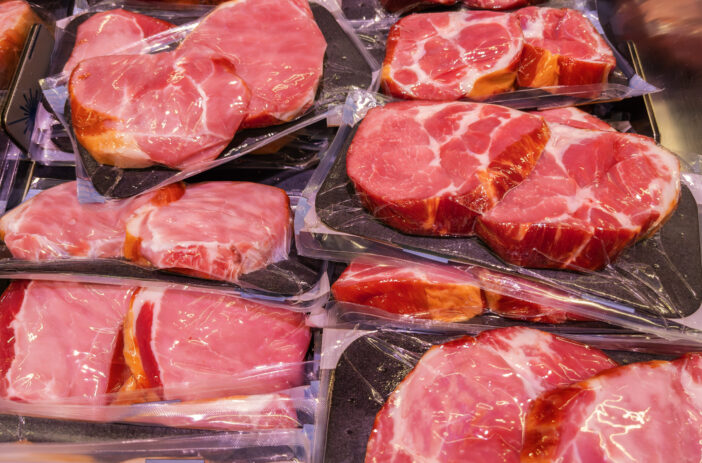5 Ethically Sourced Meat Benefits You Need to Know
Choosing ethically sourced meat means prioritizing animal welfare, sustainability, and fair labor practices. This guide helps you make responsible meat choices.

Choosing ethically sourced meat means prioritizing animal welfare, environmental sustainability, and fair labor practices. This guide will help you navigate the complexities of making responsible meat choices.
Disclosure: As an Amazon Associate, this site earns from qualifying purchases. Thank you!
Understanding Ethically Sourced Meat
Navigating the world of ethically sourced meat can be tricky. But with the right knowledge, you can make choices that benefit animals, the environment, and workers.
What Is Ethically Sourced Meat?
Ethically sourced meat comes from animals raised humanely. Farmers prioritize animal welfare, giving them space to roam, proper nutrition, and avoiding antibiotics and hormones. They use sustainable farming practices to minimize environmental impact.
Why Is Ethical Sourcing Important?
Ethical sourcing promotes animal welfare. You help ensure animals live healthier, happier lives. It supports sustainability. These methods reduce environmental damage, preserving land and water resources. It ensures fair labor practices. Workers in ethical farms receive fair wages and safe working conditions.
By understanding these aspects, you empower yourself to make better choices that support a healthier planet and humane treatment of animals.
Benefits of Choosing Ethically Sourced Meat

Opting for ethically sourced meat isn’t just a moral choice—it’s a decision that impacts your health, the environment, and animal welfare.
Health Benefits
- Reduce exposure to antibiotics. Ethically sourced meat typically comes from animals that are not treated with routine antibiotics, lowering antibiotic resistance risks.
- Avoid hormones. Animals raised ethically often aren’t given growth hormones, which some believe can disrupt human hormonal balance.
- Eat cleaner meat. These animals are usually fed a natural diet, resulting in meat with higher nutrition and fewer contaminants.
Environmental Impact
- Lower carbon footprint. Sustainable farming methods used in ethical sourcing help reduce greenhouse gas emissions.
- Conserve biodiversity. Ethical farms often employ practices that protect local ecosystems and wildlife.
- Reduce pollution. Proper waste management and minimal chemical use prevent soil and water contamination.
Animal Welfare
- Humane treatment. Animals are provided with adequate space, natural diets, and humane handling, improving their quality of life.
- Stress reduction. Lesser stress in animals leads to better meat quality since chronic stress can affect meat texture and flavor.
- Support ethical practices. Buying ethically sourced meat encourages farming practices that prioritize the well-being of animals.
Identifying Ethically Sourced Meat

Labels and Certifications to Look For
Focus on labels and certifications when shopping for ethically sourced meat. Look for reliable certifications like Certified Humane, Animal Welfare Approved, and USDA Organic. These labels confirm the meat meets high standards in animal welfare and environmental sustainability. Check for Non-GMO Project Verified to ensure animals were fed non-GMO feed.
Questions to Ask Your Butcher or Supplier
Ask specific questions to determine meat ethics. Inquire about the farm’s animal welfare standards and how animals are raised. Confirm if animals are pasture-raised or grass-fed for higher welfare. Probe about their antibiotic and hormone use. Verify traceability: Can they trace the meat back to the farm?
Popular Types of Ethically Sourced Meat

When choosing ethically sourced meat, considering the type can help ensure you’re supporting sustainable and humane practices.
Grass-Fed Beef
Grass-fed beef comes from cattle that have been raised on pasture, eating only grass and forage. This method supports better animal welfare since cows graze naturally. Look for Certified Humane or American Grassfed Association labels to ensure high standards. Grass-fed beef is typically higher in omega-3 fatty acids and lower in total fat compared to grain-fed beef.
Free-Range Poultry
Free-range poultry involves chickens that have access to the outdoors where they can engage in natural behaviors. You should find labels like Certified Humane and USDA Organic to guarantee they meet welfare standards. Free-range chickens often exhibit better overall health and produce eggs and meat with higher nutritional values.
Sustainable Fishery Practices
Sustainable fishery practices ensure fish stocks aren’t overexploited and that ecosystems remain healthy. Look for certifications like Marine Stewardship Council (MSC) and Monterey Bay Aquarium’s Seafood Watch recommendations. These practices often emphasize minimal environmental impact and support for local fishing communities, helping maintain biodiverse marine habitats.
How to Find Ethically Sourced Meat Near You

Finding ethically sourced meat can be simpler than you think. Here’s how to discover high-quality, ethically-produced meat options.
Local Farmers’ Markets
Visit local farmers’ markets to find ethically sourced meat. Farmers’ markets often feature vendors who prioritize animal welfare and sustainable farming. Speak with farmers directly to understand their practices and ensure they align with your values.
Specialty Butcher Shops
Visit specialty butcher shops that focus on high-quality, ethically sourced products. These shops often have partnerships with local producers who follow humane and sustainable farming practices. Ask the butcher about the sourcing of their products for transparency.
Online Sustainable Meat Suppliers
Explore online sustainable meat suppliers for convenience and variety. Many websites offer detailed information about their sourcing practices and provide certifications to ensure their meat is ethically sourced. Popular options include ButcherBox and Crowd Cow.
Cooking With Ethically Sourced Meat

Using ethically sourced meat isn’t just good for the planet; it’s a culinary game-changer. Here’s how to make the most of it in your kitchen.
Adjusting Cooking Techniques
- Modify Cooking Times: Ethically sourced meat, like grass-fed beef, often cooks faster. Reduce cooking times to avoid overcooking.
- Go Low and Slow: Pasture-raised meats can be tougher. Use slow-cooking methods like braising to achieve tender results.
- Monitor Temperature: Use a meat thermometer to ensure precise doneness. Overcooking ruins texture and flavor.
Flavor Differences and Enhancements
- Taste the Difference: Ethically sourced meats have richer flavors. Grass-fed beef offers a robust, earthy taste.
- Simple Seasoning: Let the meat shine. Use minimal seasoning to highlight its natural flavor.
- Enhance Naturally: Pair free-range poultry with fresh herbs. Complement the meat’s taste with rosemary, thyme, or sage.
Supporting Sustainable Meat Consumption

Opting for sustainable meat helps protect the planet and supports ethical farming practices. Here are ways you can contribute.
Advocating for Transparent Labeling
Push for clear, honest labeling on meat products. Look for certifications like USDA Organic, Certified Humane, or Non-GMO Project Verified. These labels ensure the meat you buy adheres to stringent ethical and environmental standards.
Participating in Community Supported Agriculture (CSA)
Join a CSA program to support local farms. You’ll receive fresh, ethically raised meats directly from the source. This reduces your carbon footprint and ensures you get high-quality products. Plus, it fosters relationships with the farmers who raise the animals, giving you insight into their practices.
Frequently Asked Questions
Why is it important to choose ethically sourced meat?
Choosing ethically sourced meat ensures better animal welfare, supports environmental sustainability, and promotes ethical farming practices that are better for the planet.
How can I find ethically sourced meat?
Look for labels indicating grass-fed, pasture-raised, or organic meat. Additionally, consider joining Community Supported Agriculture (CSA) programs to directly support local farms.
What are Community Supported Agriculture (CSA) programs?
CSA programs let consumers support local farms by subscribing to receive regular deliveries of fresh, often ethically sourced produce and meats, fostering a direct relationship with farmers.
How do I cook grass-fed beef differently from conventional beef?
Grass-fed beef is leaner, so it requires lower cooking temperatures and shorter cooking times to prevent it from becoming tough.
What are the benefits of transparent labeling on meat products?
Transparent labeling helps consumers make informed choices about the meat they buy, ensuring it meets their standards for ethical sourcing and sustainability.






